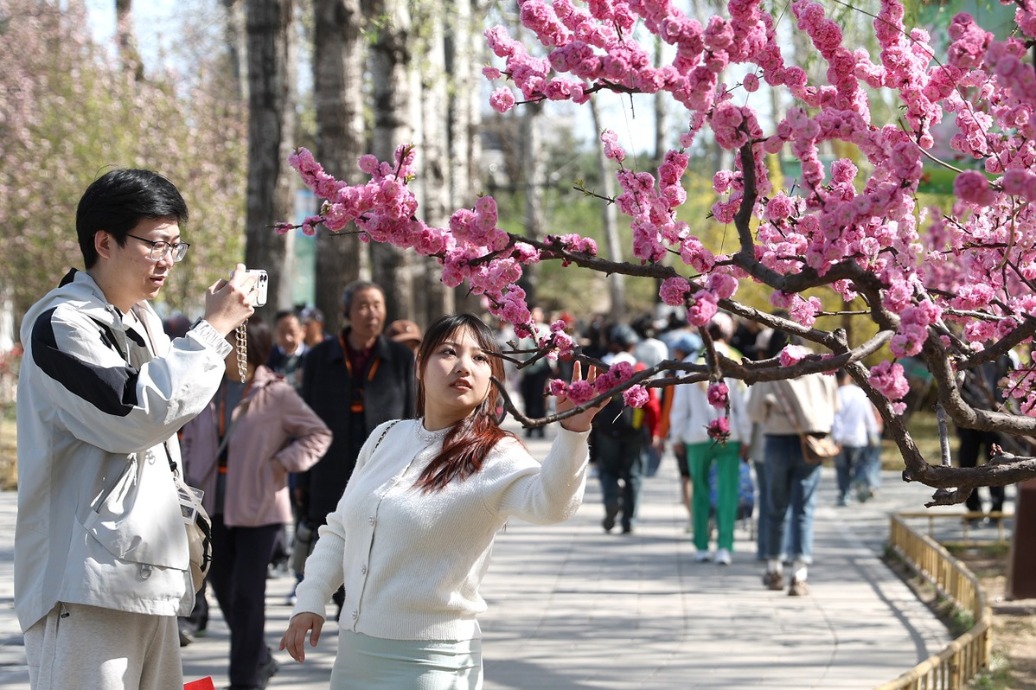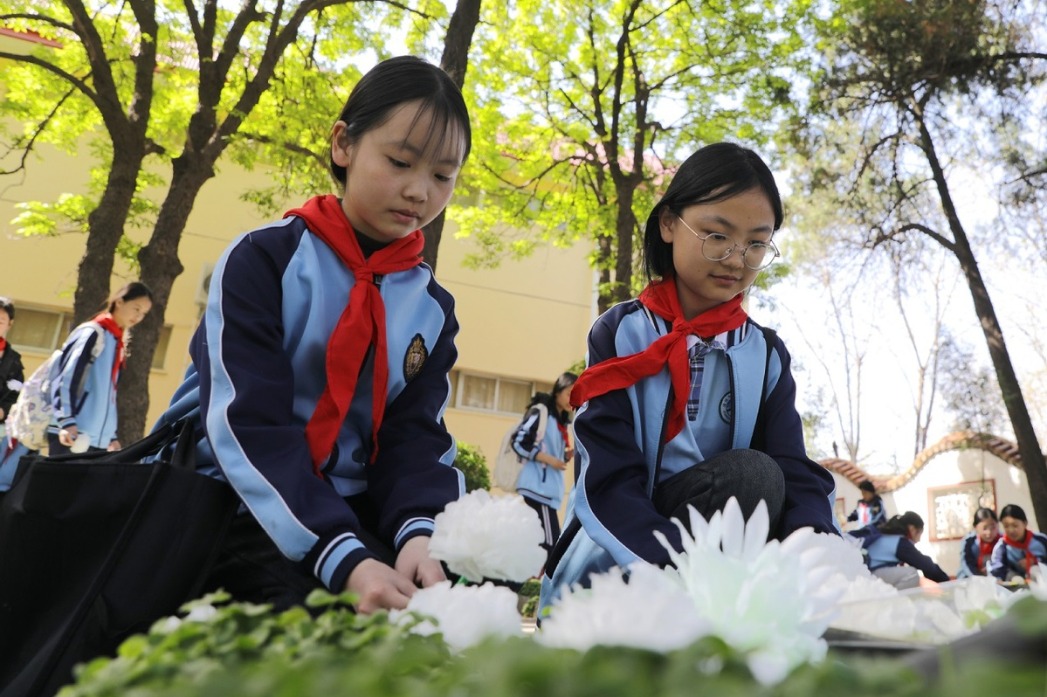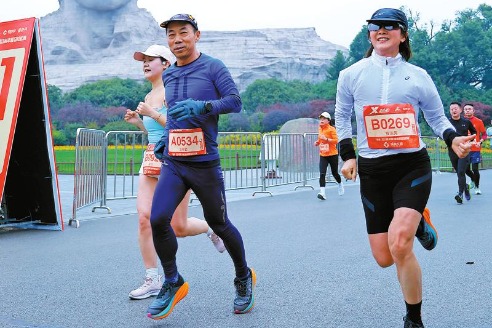Hong Kong marches ahead with prosperity, stability


Continuous mission
The buzz generated by the landmark class soon waned, but Sze continued teaching it for a decade. He did not even stop when, in 2019, the city was embroiled in constant anti-government protests, which later grew into street violence and vandalism that paralyzed business in the city and disrupted schools and trade.
The unrest also led to the arrest of thousands of residents, among whom more than 40 percent were students. Of these, about half were secondary school students and the rest were in college.
"What happened in 2019 was a wake-up call for me," Sze said. "Teaching was more than burying your head to talk about what's in the textbooks. It should be value-centered."
Sze said the social unrest had reinforced his original aspiration to introduce education about the nation and his duty as a teacher to help the young generation know their origin and identity. He then updated the curriculum by emphasizing topics related to national security and the Constitution.
Sze tried to make the class more fun by naming 12 senior students as "ambassadors" for the Basic Law. The school also held events such as "China Week", with quizzes and games that explored fun facts about the country, with prizes awarded.
Meanwhile, the 2019 social unrest also served as a wake-up call for patriots in the city and authorities.
Following the chaos on Hong Kong's streets, President Xi Jinping said that ending the violence and restoring law and order were the most important tasks for the city.
In a New Year's speech livestreamed nationwide to usher in 2020, Xi said: "Without a harmonious and stable environment, how can people live in peace and enjoy their work? I sincerely wish Hong Kong well and our Hong Kong compatriots well. A stable and prosperous Hong Kong is the wish of Hong Kong compatriots and the expectations of our motherland."
On June 30, 2020, the National People's Congress-the nation's top legislature-adopted the Law of the People's Republic of China on Safeguarding National Security in the Hong Kong Special Administrative Region, putting an end to the prolonged chaos.
On March 30 last year, the NPC, by unanimous vote, approved amending and improving the city's electoral system, aiming to keep the governing power of the city firmly in the hands of patriots.
Lau Siu-kai, vice-president of the Chinese Association of Hong Kong and Macao Studies, said the central government's initiatives to introduce the National Security Law and improve Hong Kong's electoral system have returned the city to the right track of "one country, two systems".
He said the central government had exercised overall jurisdiction with caution and prudence since Hong Kong's return to the motherland in 1997. Yet it had to step in when the practice of "one country, two systems" faced its biggest-ever crisis in 2019.
Calling the practice of the "one country, two systems" principle for the past 25 years a success, Lau said that with the aid of foreign forces, anti-China troublemakers had grown to the extreme and taken advantage of a flawed political system that didn't fully implement the principle of "patriots administering Hong Kong".
The inclusion of troublemakers in the city's governing team also led to problems such as a lack of effective governance and an absence of national identity among young people that eventually exploded in 2019, threatening the city's political stability.
When "one country, two systems" was drawn up, the central government's overall jurisdiction over Hong Kong was translated into "one country", which noted its sovereignty over the city, Lau said.
Lau also said the high degree of autonomy conferred by the central government under "one country, two systems" means that Hong Kong is entitled to partial, but not complete autonomy as the central government still holds the right to overall jurisdiction.
In a speech marking the centenary of the Communist Party of China on July 1 last year, President Xi, who is also general secretary of the CPC Central Committee and chairman of the Central Military Commission, emphasized the duty of the Hong Kong and Macao special administrative regions to safeguard national security. He also stressed that the central government exercises overall jurisdiction over the two cities.
Lau said the unrest in 2019 proved that such an approach is not only necessary, but shows foresight.
In October 2017, upholding the principle of "one country, two systems" and promoting national reunification were incorporated into the report of the 19th National Congress of the Communist Party of China, as part of the basic policy to uphold and develop socialism with Chinese characteristics in the new era.
Xi, while meeting with Hong Kong Chief executive Carrie Lam Cheng Yuet-ngor two months later, said the report of the 19th CPC National Congress points the way forward for Hong Kong, which needs to integrate with the nation's overall development.
While visiting the city in 2017 to mark the 20th anniversary of Hong Kong's return to the motherland, Xi met with young members of the Junior Police Call. The meeting prompted 22 members of the group to send Xi a handmade New Year greeting card. In 2018, Xi replied to them in a letter, encouraging them to serve the city and the country through their actions.
The pat on the shoulder served as an inspiration for these young people. Kwok Wang-hei, who was then 11 years old, still remembers the warmth of Xi's smile and his firm handshake.
Following Xi's advice to broaden his horizons, Kwok applied for study tours of Sichuan province, where he was surprised by the rapid development, including advanced technology, e-payment systems and high-speed railways.
Kwok also said that, amid the pandemic, "it was fortunate for Hong Kong to have the backing of the nation during the fifth wave of the COVID-19 outbreak, when mainland medical workers, construction workers and anti-pandemic supplies kept flowing into the city to help us battle the pandemic".
Also striving to meet Xi's expectations was Eric Kuo Wai-keung, who came to Shenzhen in 2017 when he tried to find engineers for the smart-suitcase products he had developed. He stayed in Shenzhen's Qianhai pilot zone to incubate his startup.
Kuo founded his company, R-Guardian, in Hong Kong. The company later expanded its product portfolio to smart items such as handbags, backpacks, umbrellas and a tracking watch to monitor the location of children and the elderly.
Kuo's company has received three rounds of financing, totaling over 20 million yuan ($3 million). The company is now valued at over 100 million yuan.
Behind the company's success was the right call to orchestrate the roles of different cities of the Guangdong-Hong Kong-Macao Greater Bay Area into a closely-knit team.
Kuo's success was also the embodiment of synergy among cities in the Greater Bay Area.
For the company's flagship product-a smart suitcase with global tracking and a digital lock-the research and development was done in Hong Kong. For the experienced engineers needed to bring the concept to life, the company turned to Shenzhen. Then Guangzhou came into play to iron out the prototype suitcase. Dongguan, in turn, became responsible for certain parts, while Huizhou was chosen as the production base. Finally, marketing and sales were handled by Hong Kong.
"This is a full industrial chain," Kuo said. "None of this is done by one city alone. It's teamwork."
- Chinese association opposes US move to cancel duty-free treatment for low-value goods
- Discover the charms of Qingming Festival with Yuanxi
- Philippine spy network broken up
- Green funerals rise in Mother Nature's final embrace
- Cyberattacks on Games traced to US
- Eco-burials take root in funeral industry




































